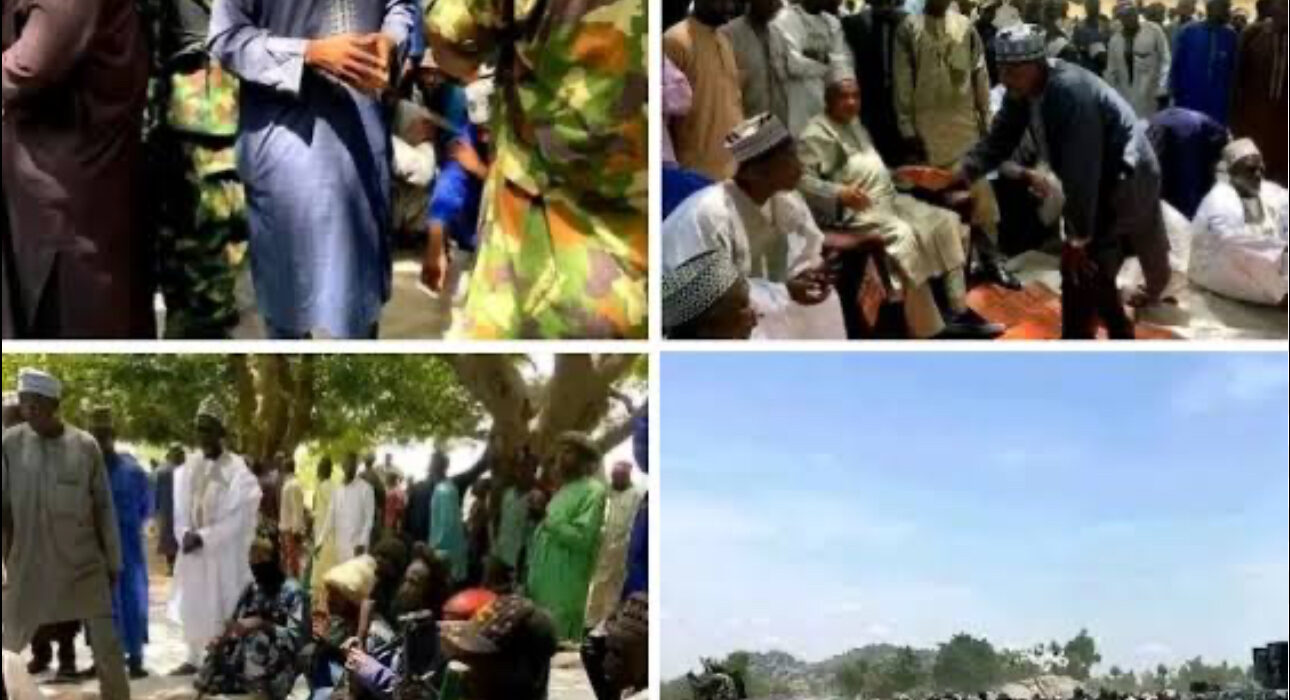Wanted Notorious Bandit Leader, Ado Aleru Appears at Peace Talks in Katsina

In a development that has sparked controversy and concern, infamous wanted bandit leader, Ado Aleru was seen among armed men attending a peace dialogue session in Kofa, a community in Batsari Local Government Area of Katsina State.
The meeting, which brought together hundreds of armed bandits, local leaders, and observers, was part of ongoing efforts to reduce violence in Nigeria’s troubled northwest.
Aleru’s presence at the gathering quickly drew national attention, not only because of his high-profile status as a wanted criminal, but also because he has been linked to some of the deadliest attacks in the region.
His appearance, though not officially sanctioned by the state government, has reignited debate over the risks of engaging in unofficial peace arrangements with violent actors.
Ado Aleru—also known as Adamu Alero—is considered one of the most feared bandit commanders in Nigeria. Operating mainly in Zamfara and Katsina states, he has been accused of masterminding brutal attacks, including the massacre in Kadisau that left over 50 villagers dead and a bold daylight assault on a military camp in 2024 that resulted in multiple soldier casualties.
Despite a formal declaration by police that he remains wanted for terrorism, mass killings, and kidnapping, Aleru was controversially turbaned as Sarkin Fulani (chief of Fulani) by the Yandoto Emirate in Zamfara in mid-2022, prompting widespread outrage.
The coronation was later suspended after intense backlash from security agencies and the public.
The recent peace talks in Batsari were part of a broader community-driven effort to reduce rural violence and insecurity.
Witnesses say hundreds of bandits attended the session, many of them armed, and that Aleru played a prominent role in the discussions.
Some participants reportedly surrendered light weapons, and tentative agreements were made to halt attacks and kidnappings in parts of Batsari and neighboring Zamfara.
However, no official disarmament occurred, and there were no binding commitments from state authorities.
A source familiar with the meeting described it as “an open dialogue,” not a formal negotiation.
The Katsina State Government has been quick to distance itself from the event. In a statement,
Commissioner for Information Bala Salisu emphasized that the state did not authorize any agreement or negotiation with bandits and reiterated that Aleru remains on the wanted list.
“The state government was not part of any deal,” Salisu said. “But if any individual or group chooses to surrender peacefully, we will consider a reintegration process.”
Local government officials who attended the event claim they did so as observers, not active participants, noting that grassroots initiatives often precede official involvement in such volatile situations.
The peace meeting has divided public opinion. Some community leaders argue that engagement—even with notorious figures like Aleru—offers a path to peace in regions long abandoned by effective state presence.
Others, however, warn that entertaining dialogue with terrorists risks legitimizing criminal networks and may undermine efforts to restore law and order through the justice system.
“This man has blood on his hands,” said a civil society advocate in Katsina who asked to remain anonymous. “He shouldn’t be talking about peace. He should be in custody.”
Security analysts are also wary. Without a clear disarmament strategy or legal framework, experts warn that such engagements might serve as mere ceasefires, easily broken if demands aren’t met or if rival factions emerge.
While the peace talks have temporarily de-escalated tension in parts of Batsari and Zamfara, there is no clear path forward. The federal government has not commented on Aleru’s reemergence, and it remains unclear whether his appearance was symbolic, strategic, or part of a broader negotiation effort behind the scenes.
For now, Katsina authorities insist they are not striking deals with criminals, though they remain open to non-violent disarmament if armed groups willingly surrender.
As rural communities await tangible security improvements, Aleru’s high-profile presence at a peace table serves as a stark reminder of how deeply entrenched criminal actors have become in Nigeria’s northwest—and the complex choices facing a government desperate to end the violence.
In a development that has sparked controversy and concern, infamous bandit leader Ado Aleru was seen among armed men attending a peace dialogue session in Kofa, a community in Batsari Local Government Area of Katsina State.
The meeting, which brought together hundreds of armed bandits, local leaders, and observers, was part of ongoing efforts to reduce violence in Nigeria’s troubled northwest.
Aleru’s presence at the gathering quickly drew national attention, not only because of his high-profile status as a wanted criminal, but also because he has been linked to some of the deadliest attacks in the region.
His appearance, though not officially sanctioned by the state government, has reignited debate over the risks of engaging in unofficial peace arrangements with violent actors.
Ado Aleru—also known as Adamu Alero—is considered one of the most feared bandit commanders in Nigeria. Operating mainly in Zamfara and Katsina states, he has been accused of masterminding brutal attacks, including the massacre in Kadisau that left over 50 villagers dead and a bold daylight assault on a military camp in 2024 that resulted in multiple soldier casualties.
Despite a formal declaration by police that he remains wanted for terrorism, mass killings, and kidnapping, Aleru was controversially turbaned as Sarkin Fulani (chief of Fulani) by the Yandoto Emirate in Zamfara in mid-2022, prompting widespread outrage. The coronation was later suspended after intense backlash from security agencies and the public.
The recent peace talks in Batsari were part of a broader community-driven effort to reduce rural violence and insecurity. Witnesses say hundreds of bandits attended the session, many of them armed, and that Aleru played a prominent role in the discussions.
Some participants reportedly surrendered light weapons, and tentative agreements were made to halt attacks and kidnappings in parts of Batsari and neighboring Zamfara. However, no official disarmament occurred, and there were no binding commitments from state authorities.
A source familiar with the meeting described it as “an open dialogue,” not a formal negotiation.
The Katsina State Government has been quick to distance itself from the event. In a statement, Commissioner for Information Bala Salisu emphasized that the state did not authorize any agreement or negotiation with bandits and reiterated that Aleru remains on the wanted list.
“The state government was not part of any deal,” Salisu said. “But if any individual or group chooses to surrender peacefully, we will consider a reintegration process.”
Local government officials who attended the event claim they did so as observers, not active participants, noting that grassroots initiatives often precede official involvement in such volatile situations.
The peace meeting has divided public opinion. Some community leaders argue that engagement—even with notorious figures like Aleru—offers a path to peace in regions long abandoned by effective state presence. Others, however, warn that entertaining dialogue with terrorists risks legitimizing criminal networks and may undermine efforts to restore law and order through the justice system.
“This man has blood on his hands,” said a civil society advocate in Katsina who asked to remain anonymous. “He shouldn’t be talking about peace. He should be in custody.”
Security analysts are also wary. Without a clear disarmament strategy or legal framework, experts warn that such engagements might serve as mere ceasefires, easily broken if demands aren’t met or if rival factions emerge.
While the peace talks have temporarily de-escalated tension in parts of Batsari and Zamfara, there is no clear path forward. The federal government has not commented on Aleru’s reemergence, and it remains unclear whether his appearance was symbolic, strategic, or part of a broader negotiation effort behind the scenes.
For now, Katsina authorities insist they are not striking deals with criminals, though they remain open to non-violent disarmament if armed groups willingly surrender.
As rural communities await tangible security improvements, Aleru’s high-profile presence at a peace table serves as a stark reminder of how deeply entrenched criminal actors have become in Nigeria’s northwest—and the complex choices facing a government desperate to end the violence.









